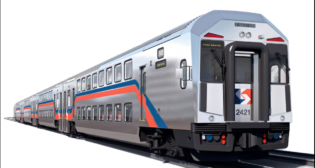
Transit Heads to Congress: “We Will Not Be Able to Support Our Regions Without Replenishing Losses”
Written by Andrew Corselli
MTA Chairman and CEO Patrick J. Foye
Metropolitan Transportation Authority (MTA) Chairman and CEO Patrick J. Foye and the leaders of 14 public transportation agencies serving communities who generate 35% of the nation’s GDP in the United States requested additional emergency federal aid for transit systems in a joint letter to U.S. Senate Majority Leader Mitch McConnell, Speaker of the U.S. House of Representatives Nancy Pelosi, Senate Democratic Leader Chuck Schumer and U.S. House of Representatives Republican Leader Kevin McCarthy.
The MTA’s own estimate shows that transit agencies nationwide will need an additional $32 billion to address the crisis for the rest of 2020 and through 2021.
Public transportation agencies across the country have been devastated by the coronavirus, and the crisis has worsened dramatically since the passage of the CARES Act—further decimating dedicated revenue streams, such as farebox, sales taxes, tolls, mortgage-related taxes and other user fees. As in previous national disasters, transportation agencies are also demanding assistance be delivered outside of traditional funding formulas and that replacement funds should be unrestricted.
Read the full text of the letter below or download a PDF here:
Dear Leader McConnell, Speaker Pelosi, Leader Schumer, and Leader McCarthy:
We greatly appreciate your leadership and hard work to quickly pass the Coronavirus Aid, Relief, and Economic Security Act (CARES Act). The $25 billion previously appropriated for public transportation agencies nationwide provided a critical backstop in response to the sudden and extreme drop in ridership and fare revenue; CARES Act resources helped stave off worst-case scenarios of complete service shutdowns that, without this relief, would have been at near-term risk of occurring. Instead, transit operators throughout the country are continuing to move health professionals, first responders, food service and other essential workers dependent upon our services during this pandemic.
We come together to request your urgent assistance in providing additional aid to public transportation agencies in the next COVID-19 relief bill. Transit agencies often rely upon a variety of non-farebox revenue sources from our taxpayers and our state and local partners to support our day-to-day operations; many of our agencies are working to assess the impacts of revenue losses not covered by the CARES Act. And though the full impact of the coronavirus pandemic is not yet fully known, the San Francisco Bay Area expects to have $1.3 billion in lost revenues through 2021 not covered by the CARES Act, NY MTA forecasts an additional $8.9 billion, and Sound Transit projects an additional $628.6 million for the same period.
Just as appropriations after natural disasters like earthquakes, hurricanes and fires are allocated based on need, funds to address this crisis should be distributed based on the loss of non-federal revenues. As was the case in the CARES Act, these replacement funds should be unrestricted, and available for any eligible activity authorized under Chapter 53 of Title 49 at a federal share of 100 percent. In parallel, we urge you to provide state and local stabilization funds to support the communities we serve.
Since we last wrote, the public health crisis has worsened dramatically across the country, and the full impact on the nation’s economy remains unknown. State and local governments are sounding the alarm to their own budget shortfalls. For public transportation agencies, a fuller picture has now emerged of the depth and breadth of COVID-19-fueled revenue losses from dedicated transportation revenue streams, such as farebox, sales taxes, motor fuel taxes, tolls, mortgage-related taxes and other user fees. All funding sources, including those from our supporting localities, that our systems rely upon are taking massive hits as a result of COVID-19, shelter-in-place orders, and the general economic downturn. Our systems will not be able to support the regions we serve without replenishing those losses. Our regions cannot recover without public transportation, and the nation cannot recover without resurgent economies in our regions.
Revenue replenishment is our most immediate need in combination with substantial investment in transportation infrastructure to facilitate community recovery while maintaining employment. Revenues that support our operations as well as critical recapitalization and expansion have been decimated by this pandemic, and replacing them with federal funds will allow us to meet our near-term obligations while maintaining critical construction activity through 2021 that will sustain hundreds of thousands of jobs in this period of unprecedented unemployment.
Federal resources will support us in maintaining our transit networks and keeping projects moving, which will help ensure continued strength of the sizable public transportation-dependent workforce both during and after this national public health emergency. Importantly, your swift action will shore up investor confidence so we can borrow at reasonable rates and maintain affordable transit services. We want to continue to rely on self-help, but we need additional federal support as a bridge so we have continued market access at affordable rates.
To reiterate, the national economy can’t rebound without strong public transportation in the nation’s major business districts. We are the circulatory systems of this country, and our agencies move over 20 million Americans every day while revitalizing our local economies in the process. The agencies represented in this letter serve populations that combined make up 35% of the national gross domestic product.
It would be a disservice to all Americans not to include a robust program to replace lost revenue for mass transit systems in the next federal relief package. Our survival is a matter of national interest. We look forward to working with you on this vitally important matter to provide real relief in real time.



